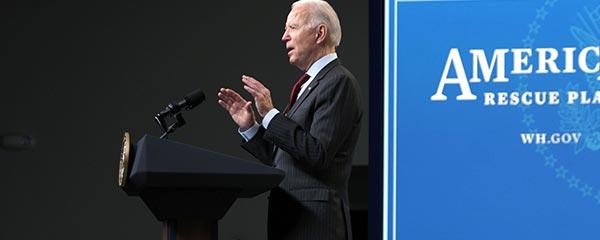The new $1.9 trillion American Rescue Plan was passed by both the Senate and the House this week and signed into law by President Joe Biden yesterday. The legislation marks a total of roughly $5 trillion in government stimulus spending passed since the pandemic began a year ago.
The new law includes stimulus payments for a large majority of U.S. households, as well as supplemental unemployment benefits and tax credits, aid to local and state governments, money for COVID testing, grants for schools to facilitate reopening, healthcare subsidies, aid for restaurants, expanded child tax credits, provisions to aid struggling multiemployer pension plans, and much more.
The new legislation once again brings into sharp focus conflicting opinions on the appropriate role of the federal government in Americans' daily lives -- at the center of controversy and dispute since the drafting of the U.S. Constitution 230 years ago. The stimulus plan accelerates the use of government as a mechanism for solving problems and helping Americans financially, a sharp contrast to what we saw in the 1980s when Ronald Reagan said, "Government is not the solution to our problem; government is the problem." This is a sentiment we have not often heard expressed over the past year.
Some observers certainly think that we have entered a new era of government control and influence. In recent weeks, we've seen opinion writers and journalists arguing that "the era of small government is over" and "the Reagan era is over" and opining on the "return of big government" and a "seismic shift in U.S. politics."
Of course, government has been a huge part of our American lives for many, many years. The issue is one of incremental change. Is government now going to settle into an even more expanded role than it has in the past? And, importantly, is the American public now going to be even more welcoming of a major government presence in their daily lives, and to increasingly turn to the government as the solution to their financial problems?
Arguments for Increased Public Acceptance of Big Government
One thing is clear. The American public, taken as a whole, strongly endorses this current stimulus legislation. Every survey I have seen shows majority support, including a new poll from CNN/SSRS showing 61% approval, a Monmouth University poll showing 62% support and a Pew Research poll showing 70% approval.
This is not new; Americans have supported government stimulus spending since the pandemic began. Plus, there are other signs of the public's approval of government involvement in their lives.
║┌┴¤═°'s September Governance poll each year includes a general question asking about the optimal role of government. The latest update shows that 54% of Americans say the government should do more to solve our country's problems, while 41% say the government is trying to do too many things that should be left to individuals and businesses. This is the highest percentage choosing the "government should do more" option since ║┌┴¤═° began asking the question in 1992.
A major concern for those who are worried about big government is a ballooning deficit, but I can't find evidence to suggest that is a big issue for Americans at this point. Indeed, if the deficit is a concern, Americans appear to be willing to increase government income with elevated taxes on high-income families and with a wealth tax on "ultra-millionaires," as proposed by Sens. Elizabeth Warren and Bernie Sanders.
Plus, it is worth reiterating that the American public has for a long time been quite accepting of government intervention in our lives on a number of fronts. The American people appreciate Social Security (the No. 1 source of income for retired Americans) and admire the military (one of the biggest recipients of federal spending each year), and older Americans welcome their government-funded Medicare. And, by contrast, Americans historically have little interest in proposals for radically cutting back on the size and power of federal government. Before the 2016 election, for example, presidential candidate Ted Cruz and others advanced proposals for such things as eliminating entire government Cabinet departments, abolishing the Internal Revenue Service, cutting back on government hiring, and requiring that government regulations be eliminated before new regulations could be put in place. Well less than half of Americans agreed with any of these proposals.
Arguments for Why Big Government Will Not Be Accepted
There are, on the other hand, reasons to argue that this is not the beginning of an era of public acceptance of massively bigger government.
For one thing, we are not seeing a new, glorious era of bipartisanship surrounding the decision to spend trillions on another stimulus package. The Monmouth University poll found 92% support for the stimulus plan among Democrats but only 33% support among Republicans. CNN found similar numbers, with 94% of Democrats and 26% of Republicans favoring the plan, while Pew Research showed 94% support among Democrats and Democratic-leaning independents compared with 41% among Republicans and Republican-leaning independents. This partisan bifurcation in attitudes toward the stimulus plan is even stronger in Congress, where zero Republican senators and zero Republican members of the House voted in favor of it.
The fact that Republicans are holding on to their traditional views that government should be restrained could mean less big government if and when Republicans take back control of one or both houses of Congress.
I noted earlier that 54% of Americans favor more government intervention to solve problems, the highest in ║┌┴¤═°'s almost 30-year history of asking the question. But this is not necessarily a permanent trend. Attitudes toward the role of government have waxed and waned over the years, prompting ║┌┴¤═° analysts to conclude that a "rise in pro-government views may be episodic."
An extensive review of public opinion on government conducted by my colleagues Jeff Jones and Lydia Saad in November 2019 found that while pro-government views had increased since 2010, there were still signs of trepidation about government taking on a larger role in society. For example, a relatively small 25% of Americans said they would opt for more services and higher taxes rather than fewer services and lower taxes. Another question showed that less than half of Americans wanted the government to take active steps in every area it can to try to improve the lives of its citizens, while the rest were more negative about the role of government.
Republican Rep. Matt Gaetz of Florida has called the new stimulus plan "a Trojan horse for socialism," while Missouri Republican Sen. (and 2024 presidential aspirant) Josh Hawley said the "coronavirus stimulus bill is a left-wing socialist giveaway." In their use of the word socialism as a pejorative, these conservative politicians are generally in sync with majority American public opinion. The 2019 review showed that socialism as a concept has a more negative than positive connotation among Americans, with 57% reporting a negative view of the term and 39% a positive view. This contrasts with the much more favorable views of free enterprise and capitalism in the same poll. In other words, if critics succeed in branding government stimulus spending as creeping socialism, they may strike a responsive chord.
Other public opinion data suggest that Americans are not in favor of big government in all instances, including healthcare, where ║┌┴¤═°'s latest update shows the majority of U.S. adults still favor a system based mostly on private health insurance. Americans are also not overly enthusiastic about the government taking on more responsibility for protecting major U.S. corporations that are in danger of going out of business, reducing income differences between the rich and the poor, or upholding moral standards among its citizens.
Last August, Americans had a generally negative image of the federal government, lower than the image of any other of the 25 business and industry sectors tested. This does not bode well for long-term acceptance of an expanded role for the federal government in Americans' daily lives. Additionally, a ║┌┴¤═° report noted a few months ago that "Trust in Federal Government's Competence Remains Low" -- while trust in state and local government is much higher. (It is possible that trust in the federal government could rise as a result of the vaccine rollout or maybe the new stimulus law itself, while the February power crisis in Texas probably did little to enhance the image of state government leadership.)
Bottom Line
The newly passed $1.9 trillion stimulus plan is the latest in a series of massive government spending bills passed into law since the beginning of the pandemic, and it will in turn be followed by Biden administration efforts to pass a huge infrastructure bill. And progressive Democratic politicians would like to see even more government action -- including universal healthcare, the provision of housing for everyone and even a guaranteed basic income for all Americans.
Whether we are indeed at the threshold of a new era of the public's acceptance of bigger-than-ever government is, however, not yet clear.
The pandemic has been the major factor in Americans' lives for the past year but will -- hopefully -- be receding in its impact as increasing numbers of Americans get vaccinated and the nation reaches herd immunity. If the economy and jobs situation improve markedly, there could in turn be a backlash of sorts to continuing increases in government spending. And the razor-thin margins of Democratic control of the House and Senate could shift in 2022 or 2024, allowing Republicans to again press their emphasis on curtailing major government spending programs.
History shows that Americans tend to adopt big government initiatives when there are big problems facing the nation -- including COVID-19, the Great Recession, 9/11, World War II and the Great Depression. Some of these big government initiatives have stayed in place ever since, including Social Security, intrusive screening procedures at airports and increased federal regulation of banks. On a cumulative basis, there is much more government involvement in Americans' lives today than there was 120 years ago, when there was no income tax, no entitlement programs, no national healthcare programs, no equal opportunity mandates and little government regulation of business. Big government, in short, has clearly been a fact of life in the U.S. before the stimulus plans of the past year. The question going forward is more about the trajectory of the continuation of this long-term trend, and less about the sudden arrival of a new era of government involvement in our lives.




